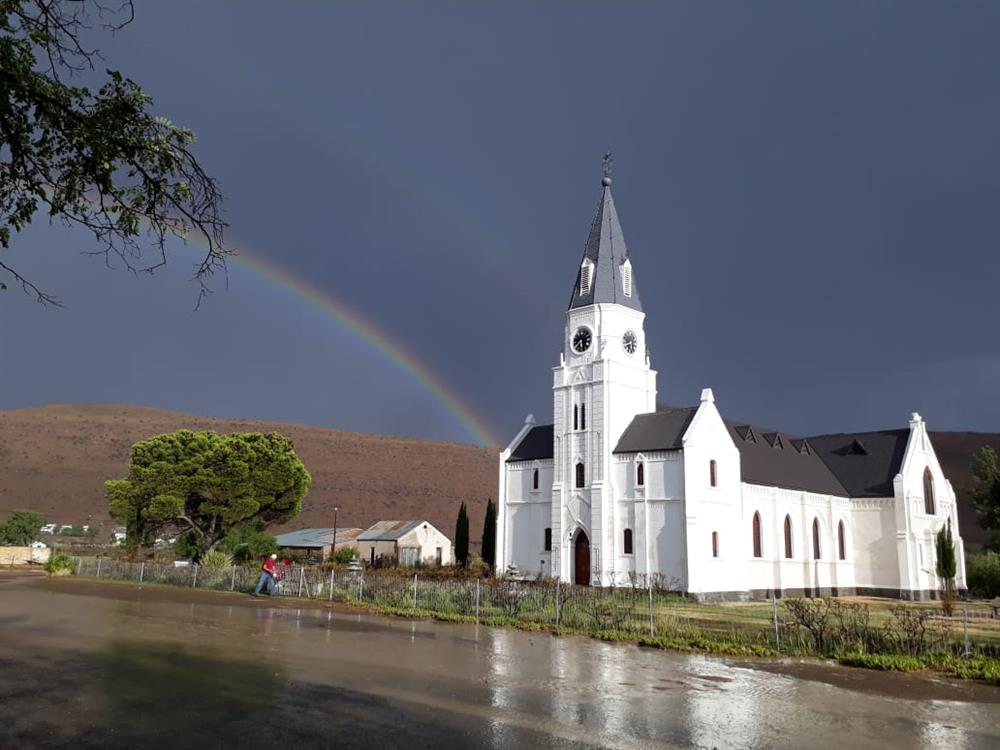NIEU-BETHESDA NEWS – Up until last week, Nieu-Bethesda had had precious little precipitation since a few drops fell last October.
The veld surrounding the village was tinder-dry and starving animals roved the streets in search of food.
On Tuesday, 29 January, a fire which began as a lightning strike the night before was reported to be ripping through Eureka, Highlands, Diepkloof and Doornberg.
Gale force winds and high grassland and bush fuelled the fire which raced over the municipal dump at the top of the pass overlooking the village.
Within half an hour, the flames burned high and furiously at the foothills of the valley adjacent to the village itself. Villagers were concerned. Those who had hosepipes watered down walls, small farmers evacuated their livestock and some packed bags ready for evacuation.
The sky over the valley loomed orange with smoke and a fine black ash covered everything, finding its way through keyholes and cracks. General panic ensued. There was a call for prayer and arrangements were made to meet to pray for rain on Wednesday at the Grootkerk.
Fortunately, the fire burned back on itself and turned back toward Compassberg where it continued to ravage Wilgerbosch, Dalveen and the back of the iconic mountain. With the village no longer under threat, farmers loaded bakkies and ensured that homes and lands were safe. The ominous glow behind Compassberg continued through the night.
As villagers swept up ash and smoke on Wednesday the 30th, a coolness descended on the valley.
Later that afternoon a fierce storm brewed and hail the size of cherries started to batter corrugated iron roofs, filling leafy gutters and small celebrations ensued. But rain had started to fall on farms surrounding the village, and some of those driving towards a local church's prayer meeting had to turn back as roads and rivulets made travel difficult.
With the church deep in prayer, indigo rainclouds formed a dramatic backdrop and a rainbow of hope made for a powerful picture captured by Hanna van Heerden. It had rained a little and gratitude and amazement abounded.
 NG Kerk in gratitude. Photo: Hanna van Heerden
NG Kerk in gratitude. Photo: Hanna van Heerden
But who knew of what was to come!
That night, as people sat on stoeps breathing in the cooler air, a remarkable sound filled the valley. With no real rain falling over the village at that time, everyone realised that this was the sound of the Gats River in spate and rushed down to witness this spectacle.
In the darkness, after months of no rain, the smell of the river is what hit one first – while ‘petrichor’ is the term used to define the smell of rain on the earth, this was different. After so long, the water had drawn the odour of drought to the surface, and a deep, mushroomy, smokey smell emanated from the rushing water in an unusual juxtaposition - the water smelled of fire! The ash-black water that had run down the fire-blackened slopes into the tributaries gushed over rocks, through reed beds and forests.
That night, the river behind the squatter settlement in Kooikamp, broke its banks and a sea of silt flooded those in its path. The next morning, Izak and Kathleen Kasper sat in awe in front of their shack where the water had literally run under their bed. Ever positive, they spoke of gratitude of the much-needed water which had deprived them of sleep that night.
And so it is in the Karoo. It is a place of contrast, of drought and flood, of fire and ice, of hardship and abundance. A few days after the rain, small shoots emerge, lawns grow as you watch them and once dry river beds become beautiful pools of life. The heaviness and worry abate, and frowns are lifted from foreheads as new energy fills the ether for a while.
 Izak and Kathleen Casper after the deluge.
Izak and Kathleen Casper after the deluge.
 Fire in the evening up the pass to Ganora.
Fire in the evening up the pass to Ganora.
'We bring you the latest Nieu-Bethesda, Karoo news'
















